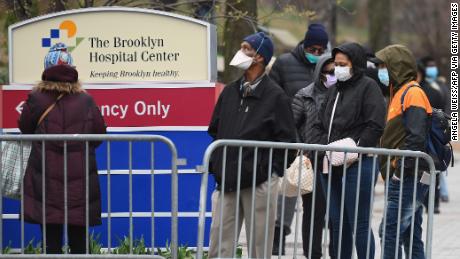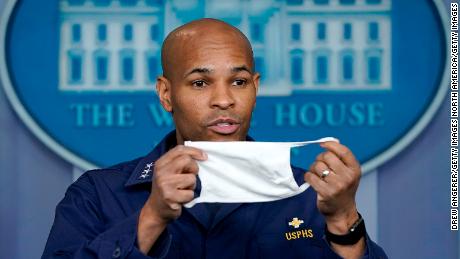(CNN)For the longest time in this pandemic, coronavirus had infected and killed more African Americans in Mississippi than White people, which experts explained in part by pointing to racial health disparities in one of the most impoverished states.
Early on, Black Mississippians accounted for roughly 60% of the state's cases and deaths, the state health department says.
But the tide has turned in the Magnolia State.
Just as the country is seeing a resurgence in Covid-19 cases, Mississippi is, too -- but now with cases among White people leading the way.
Whites surpassed African Americans in Mississippi's overall reported Covid-19 death toll around September 21 for the first time since the state health department started publishing data by race in June.
The same happened with total Covid-19 cases around October 14. Both categories, then, are aligning closer to the state's overall population: 59.1% White and 37.8% Black.
While several factors may be at play, the state health officer suggests one in particular: He thinks large segments of the White population aren't social distancing and wearing masks as wholeheartedly as much of the Black community has been recently.
"As far as the case trends, we have had really pretty good uptake by a lot of folks in the Black community with masking and social distancing," state health officer Dr. Thomas Dobbs told reporters October 16, when asked about an uptick in White cases. "We've worked very aggressively to make sure that the Black community understands where the risks are and what can be done to prevent that.
"And I just will say ... I think big parts of the White community, especially in areas that maybe weren't as hard-affected (previously), have not been as compliant or engaged actively with social distancing and masking. And I think that does make a difference."
Asked about this Thursday, Dobbs told CNN he's relying somewhat on anecdotal evidence, but also "looking at how schools are operating. We are seeing a lot more enthusiastic compliance with ... masking in public" and social distancing "in the Black community."
And, "we've seen a lot of stuff (with) parent-sponsored youth events -- dances, parties, things of that nature, that have really undermined a lot of our efforts to keep the schools open," he said.
Dobbs highlighted a case to reporters earlier this week: Sumrall High School outside Hattiesburg closed for two weeks starting October 15 because of a Covid-19 outbreak that "seems to be related to an extracurricular social event put on by families and parents," he said.
Sumrall High, with about 560 students, is in a county with a 75% White population. Another school also in Lamar County, Purvis Middle School, announced Sunday it also was closing for two weeks because of Covid-19, CNN affiliate WDAM reported.
Mississippi reissues mask mandates for some counties as cases rise
Dobbs' words about mask-wearing and distancing come as Mississippi, like the country, is seeing rises in new daily cases after easing down from a summer surge.
After Mississippi reached a pandemic peak seven-day average of 1,360 new daily cases in late July, Gov. Tate Reeves announced a statewide mask mandate August 4 for social gatherings and indoor retail and school settings.
On September 14, Mississippi reported its post-peak low for average daily cases: 412, Johns Hopkins University data show. That meshes with the country's post-peak case low of September 12. Reeves allowed the statewide mask mandate to expire September 30.
Case averages are now on the rise, reaching the 750s this week. On Monday, Reeves put nine of Mississippi's 82 counties back on a mask mandate and limited their indoor gatherings to 10 people, citing high case numbers there.
"None of these elements are silver bullets," Reeves told reporters Monday. "I don't expect that any of these measures will eliminate the virus, and we have to allow for life to go on in the meantime. As we wait for a vaccine, our mission is the same ... it is to prevent our health care system from becoming overwhelmed."
Cases and deaths among Whites are rising faster than those among African Americans
As for racial differences, whereas Dobbs said African Americans accounted for about 60% of cases and deaths early in the pandemic, by June 21, Blacks accounted for about 51% of total cases and deaths, with Whites making up 27.8% of cases and 41.6% of deaths, state health department data show.
Native Americans had 4.35% of cases and 5.5% of deaths. No Asian deaths were reported by then, and Asians represented less than 1% of cases.
Hispanics on June 21 accounted for 5.4% of cases and 1.6% of deaths, but their numbers also are included in each racial category such as Black or White.
Cases and deaths among White Mississippians kicked up in the summer but really took off in comparison with African Americans' data in September, by which time Whites' cases were accumulating at twice the rate of Blacks', state health department data show.
By Tuesday, White people accounted for nearly 47% of the state's 3,323 total deaths, versus 46% for Blacks, 2.7% for Native Americans, and less than 1% for Asians. Hispanics of any race were at 1.3%.
And by Tuesday, Whites represented a plurality of the state's 112,123 total cases at 38.8%, with 37.9% for Blacks, Native Americans at 1.2%, and less than 1% for Asians. "Unknown" and "other" accounted for 14.6% and 7.2%, respectively. Hispanics of any race were at 2.8%.
In October's first two full weeks, about 60% of the state's new cases and deaths were among White Mississippians, Dobbs said Monday.
"Indoor social events are what's driving the transmission of coronavirus in Mississippi. ... If you're going to do something, do it outdoors," Dobbs said last week.
Official messages about Covid-19 precautions may be a factor
That African Americans were hit hardest first in Mississippi is no surprise to Girmay Berhie, dean of Jackson State University's College of Health Sciences and School of Public Health.
Studies have shown Covid-19 disproportionately hurts African Americans, in part because they have more existing medical issues that can make the disease worse.
Berhie says 70% of people in Mississippi with one or more chronic disease are African Americans. And the state has lots of long-term health problems: In 2018 it had the highest death rates for hypertension and kidney disease; second-highest death rates for cancer; and third-highest for heart disease and diabetes, according to the CDC.
High concentrations of poverty are also correlated with concentrations of poor health, Berhie says.
About 19.8% of the state's population lived in poverty as of 2018, according to the US government. Of the 20 counties with the highest percentages of residents in poverty -- about half of which are in the Mississippi Delta -- 19 have a Black-majority population.
"Covid-19 exposed glaring health disparities in the African American community, and as a result the African American community are paying the price," Berhie said in a phone interview Thursday.
He says he has no data to back Dobbs' claim that African Americans in Mississippi are more readily social distancing and wearing masks than large numbers of White people -- but he suspects Dobbs is correct, in part because of what he's seen in Jackson, Mississippi's most populous city in a county that is 73% Black.
Jackson State, he said, has heavily pushed social distancing and mask wearing not only on campus but in the wider community, once hosting a town hall with 22 African American churches or religious groups to trumpet the message.
Jackson city government also has issued orders that have been more restrictive than the state's, such as requiring masks in public places before and after the statewide mandate. When Berhie goes to Jackson groceries, he sees most people wearing masks, but more so among African Americans, he said.
Dobbs put it this way Thursday: "It may well be we've found a pretty receptive audience in the African American community, and it may well be because they were hit so hard and have personal experience. But we're not having the same success we've seen with other segments of the population."
One possibility, Berhie said, is that people inclined to listen to the White House may hear its mixed messaging on mask support and decide masks aren't necessary.
President Donald Trump won Mississippi in 2016's election by 17.8 percentage points. He garnered far more support in White-majority counties than Black-majority counties.
"When I hear Dr. (Anthony) Fauci saying A, and other people hear the President saying B, those are not good. We have to be ... giving the same message," Berhie said.
"It does not matter if I am conservative or liberal, short, tall, White, brown or red. Health is health. We should follow science and enable data. The message should be the same," he said.








